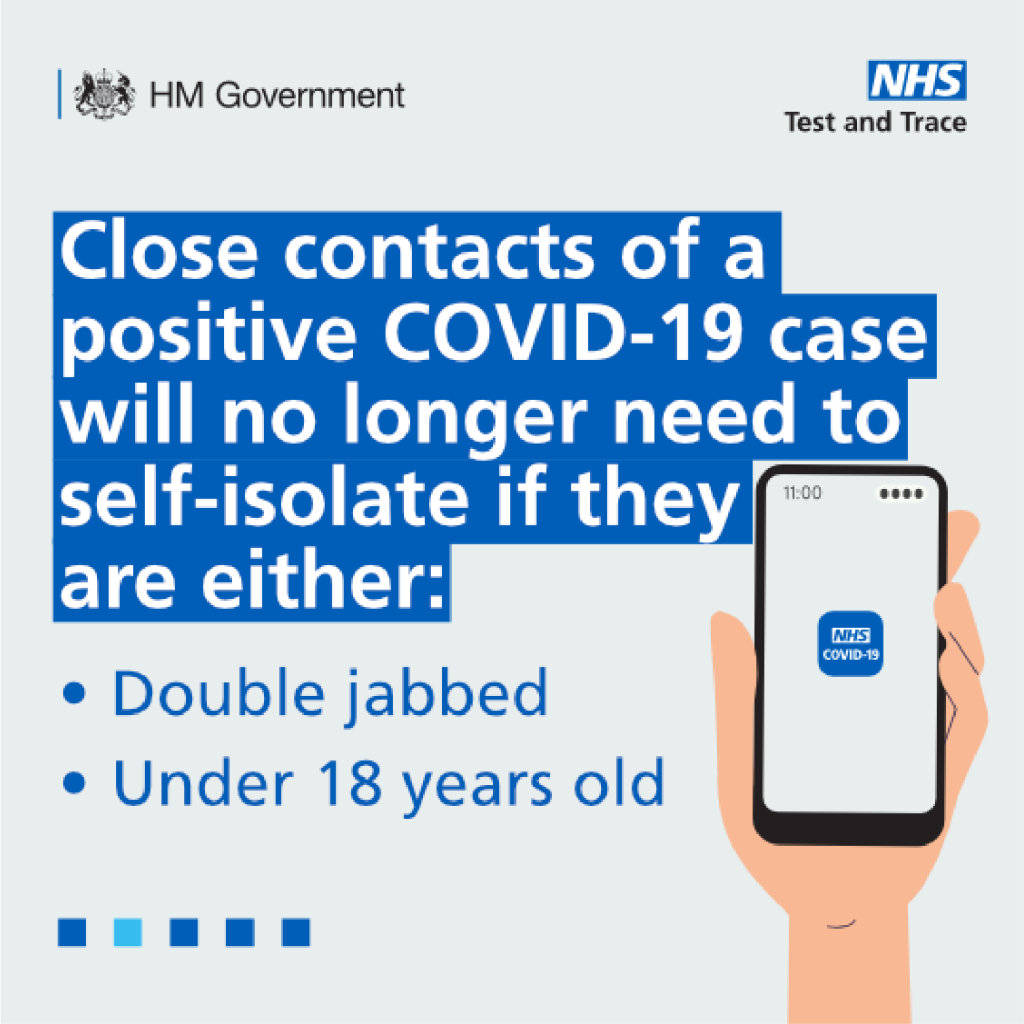People who are double jabbed or aged under 18 are no longer legally required to self-isolate if they are identified as a close contact of a positive COVID-19 case. The change was announced last month, as part of step 4 of the government’s COVID-19 roadmap. With 75% of people having received both doses of the vaccine, the majority of adults will no longer need to self-isolate if they are contacts.
These changes have been made as a result of the remarkable success of the UK’s vaccine programme, with over three quarters of UK adults now double jabbed. The latest data from Public Health England and Cambridge University shows that around 60,000 deaths, 22 million infections and 66,900 hospitalisations have been prevented by the vaccines.
From 16th August, double-jabbed individuals and under 18s who are identified as close contacts by NHS Test and Trace are advised to take a PCR test as soon as possible to check if they have the virus and for variants of concern. People can order a PCR home test here or by calling 119, or going to a local test site.
As double-jabbed people identified as close contacts are still at risk of being infected, people are advised to consider other precautions such as wearing a face covering in enclosed spaces, and limit contact with other people, especially with anyone who is clinically extremely vulnerable. They will not be required to self-isolate while they wait for the results of the PCR test.
Double-vaccinated adults are now no longer required to self-isolate, as long as they received their final dose of an MHRA-approved vaccine in the UK vaccination programme at least 14 days prior to contact with a positive case.
Anyone who tests positive following the PCR test will still be legally required to self-isolate, irrespective of their vaccination status or age in order to break onward chains of transmission. Meanwhile anyone who develops COVID-19 symptoms should self-isolate and get a PCR test and remain in isolation until the result comes back.
In line with step 4, ‘bubbles’ will end for all children under 18, social distancing will no longer be necessary, and schools will not need to stagger start and finish times. Two on-site tests should be taken by each secondary school and college student on return, followed by twice-weekly testing at home. The government will review testing requirements by the end of September.
Workplace daily contact testing scheme
The workplace daily contact testing scheme will continue, with testing sites offering daily testing as an alternative to self-isolation for close contacts who are not double jabbed. Over 700 sites are now in operation across critical sectors, and over 1 million test kits have been distributed.
NHS COVID-19 app
Updates will be made to the COVID-19 app to align with the changing requirements to self-isolation. App users identified as a close contact who confirm that they are double vaccinated or under 18 not need to self-isolate and will be given advice to book a PCR test.
If someone is called by NHS Test and Trace and told they are a contact, they will be asked their age and their vaccination status. If using the NHS COVID-19 app, people will be asked to self-declare if they are under 18 or double vaccinated.
Background information
The following groups of people identified as close contacts will no longer be required to self-isolate. If their self-isolation period began before 16 August and was due to end after 16 August, they may now leave self-isolation:
- double-vaccinated adults: those who received their final dose of an MHRA-approved vaccine in the UK vaccination programme at least 14 days prior to contact with a positive case
- children and young people: those under the age of 18 years. Those turning 18 will be treated in the same way as children until the age of 18 years and 6 months, to allow them time to get vaccinated
- clinical trial participants: those who have taken part in – or are currently taking part in – an MHRA-approved COVID-19 vaccine clinical trial. Those who received their final dose of an MHRA-approved vaccine in the UK vaccination programme, at least 14 days prior to contact with a positive case.
- medical exemptions: those who can evidence that they cannot be vaccinated for medical reasons.
- as with double vaccinated adults, children under 5 who are close contacts of a positive case will instead be advised to take a PCR test. If the PCR test is positive they will need to self-isolate, as any other positive case
- children who are aged under 5 years old who are identified as close contacts would only be advised to take a PCR test if the positive case is in their own household.



